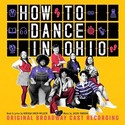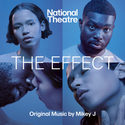|
 HOW TO DANCE IN OHIO HOW TO DANCE IN OHIO
2023 BROADWAY CAST
Center Stage Records
CD | Digital
Over the last half-century, plots of Broadway shows have often put the spotlight on dancing: A Chorus Line, The Tap Dance Kid, Saturday Night Fever, Ballroom, Never Gonna Dance, Six Dance Lessons in Six Weeks, Dirty Dancing, and even Dances with Vampires. Quite recently the dance du jour was The Prom for high schoolers in Indiana, and this year its neighboring state was the location for a formal dance for a group of young people when How To Dance in Ohio waltzed across the stage. The sparkling cast album of the now-closed musical presents ample evidence of its charms and characters one readily wants to root for. They're based on the real-life people in the 2015 documentary of the same name, profiling seven autistic youths; notably, they're played by actors on the spectrum.
This is a life-affirming story about members of Dr. Amigo's social skills group, seen together at their counseling center and in various settings as they set a goal of having their own fancy-dress prom. Among other issues for these pressured, insecure people there is the possibility of pairing up as each other's official dates and, of course, acquiring some dancing skills. Like dancing itself, progress in building self-confidence with interpersonal communication is a one-step-at-a-time process. The appealing songs, with lyrics by Rebekah Greer Melocik (who also penned the book) and music by Jacob Yandura, are engaging and characterful. They are nicely handled by the cast, with strikingly rich harmonies the major asset of what greets our ears.
While the lyrics do not shy away from being honest and direct to reveal each character's concerns and details of their situations, the underlying emotions are often universal. Who among us has not–currently or in our younger years–felt disheartened, determined, doubtful, thwarted, thrilled, or just confused? These feelings and more are nailed in songs that may occasionally feel a bit too on-the-nose or too tersely articulate for people still in their teens. But a little artistic license is expected in musicals, even those based on real people and events.
Seeing the show on stage, I found it generally endearing. Hearing the songs again on the cast recording, I find it moving and can also appreciate the craft, the caring, and the catharsis coming through. The detail in the orchestrations precisely punctuates the songs in key lines and their end "buttons" that really pop. Vulnerability radiates in the timbre of some voices, especially Liam Pearce as Drew who is trying to be his best independent self as decisions loom about going to college. His singing on "Building Momentum" brings out optimism and excitement with its standout kinetic melody and build. Madison Kopec as Marideth, a loner more comfortable with books than people, captures shyness and the lurking desire to shed her timid skin. In "Drift" she has a number that deftly compares the slow moving of the world's continents to people getting closer (or not).
The title song is attractive, but is anticlimactic in its brevity. (There was originally more material dedicated to the subplot about Dr. Amigo and his adult daughter, who–conveniently–had pursued being a dancer and is working with her dad while recovering from an injury; it was trimmed after early performances.) The adult characters have their perspectives musicalized for balance, but it's the young people's material that is richer and more impactful and impressive in design and execution.
A reunion concert with the show's original Broadway cast, plus additional guests, has been announced for May 20 at Palladium Times Square. Meanwhile, via this recording, it is rewarding and involving to revisit this sweet musical that earns its relatability and our attention.
 THE EFFECT THE EFFECT
MUSICAL SCORE FOR THE PLAY
Broadway Records
Digital
England's National Theatre 2023 revival of the 2012 play The Effect, which was also presented last month in New York at The Shed, came with atmosphere via sound. (There is no singing–it's not a musical.) The electronic score created for it is now available as a digital set of 33 separate tracks that accompanied stage action and was played under dialogue in this drama about the interactions of a man and woman housed together in an antidepressant medication study. (Two supervising doctors are the other characters.) In length, many of the selections last for about a minute or two (some even less) and endings can be abrupt. In total, the playing time is a bit under an hour. (The play itself runs for an intermissionless 100 minutes.)
Don't expect to hear long-lined, legato melodies that resemble songs one could imagine having lyrics. Typically, a segment of electronic instrumentation and sound effects in The Effect introduces a series of just a few pitches or percussive beats. The steady intense rhythm strongly resembles the beating of a heart. A motif can repeat and repeat, insistently, becoming a relentless mini-"themes and variation" program, claustrophobically suggesting tension and eeriness. As the spooky but minimalistic, unrelenting cloned tones hammer away at our ears and brains, the music's impact might be intentionally analogous to the mind-numbing, disorienting sensations experienced when taking drugs. And, just as people respond differently to the same medication, some listeners will find this more tedious than mesmerizingly hypnotic. While many of these beat-heavy slices of mood-altering sonics rely on the plan of a severely limited musical range, several have more variety and build.
It's certainly a different kind of release, and these electronic creations by Michael "Mikey J" Asante are in a style far afield from my more traveled musical paths. Not having seen the play, I had to wonder how these pieces worked as part of the in-person theatrical experience and how it illuminated the experiences of the two pill-takers who become lovers, but wonder if their feelings are caused by the drug when they learn that one could be taking a placebo. So I think it's instructive to quote some of the descriptions found in the many reviews of The Effect. They variously characterize the music as: a "throbbing soundscape, which keeps us on tenterhooks," "recreating the adrenaline feeling the characters go through;" a "cinematic score contributing to the sensation of disorientation, viscerally affecting." Another notes "pulsing beats and heavy breaths with a force that can feel ritualistic as though driving out devils." Adjectives used in other reviews are "portentous," "propulsive," "overpowering," and just "loud and thumping."
Checking out the voluminous samples of The Effect may remind you of times you spent just listening to the soundtrack album from a movie in the suspense/mystery genre. You're hearing, front and center, music that was composed to accompany action, with some of it played under dialogue to which it can add drama and tension, but mustn't upstage. The elements are meant to be married and work together; subtracting one makes for a quite different experience, as it would be if you watch a heavily scored movie at home and turn off the sound. Your side effects caused by The Effect may be a sense of dizziness and danger or a nightmarish vicarious electric jolt, but it certainly fills a prescription for something that pushes the envelope.
|
|